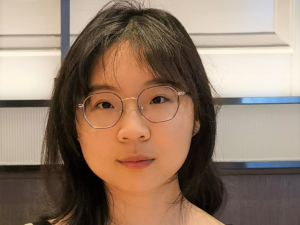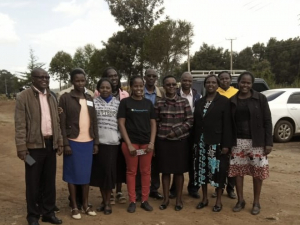Julia Nicholas wins 2019 Zener award

Congratulations to Julia Nicholas, winner of the 2019 Karl E. Zener Award. This award is given annually to an undergraduate psychology major at Duke University who has shown outstanding performance and scholarship, as determined on the basis of both the honors thesis (evaluated by a committee of faculty members) and the total academic record.
"Julia is going to make the world a better place," said Dr. Nancy Zucker, her faculty mentor. "She is passionate about studying how people's negative life experiences, such as the experience of weight stigma, can prevent individuals from flourishing. I really think that her findings that restrictive eating in social settings mediates the relationship between internalized stigma and binge eating can lead directly to intervention strategies that could help the 10-15% of the population that struggle with binge eating."
As part of her study, called EMBODI (The Eating, Memory, and Body Image Study) and honor's thesis, Julia drew on a growing body of research on weight stigma. This research focuses on the health impacts of weight stigma and the negative attitudes and stereotypes that lead to discrimination against those who are overweight. In her study, Julia focused on the role of internalized weight bias (when someone applies an attitude/stereotype about weight to their own self image) on eating behaviors in young adults. Despite the widespread misconception that weight stigma is “good for us” — that fear of gaining weight promotes healthy eating and exercise — prior research has actually demonstrated that experiencing and internalizing weight stigma is associated with exercise avoidance and binge eating.
"When I set out to conduct this study, I asked, why is internalized weight bias a risk factor for binge eating?” Juila said. "I wondered if binge eating might actually be the result of attempts to restrict eating, particularly in front of other people. I thought that perhaps people with high levels of internalized weight bias might be more likely to restrict their eating in front of other people, because they did not want to call attention to how much they were eating and confirm stereotypes about those who are overweight."
In order to test this hypothesis, she conducted an online survey of Duke undergraduates, which included measures of internalized weight bias, binge eating, and restrictive eating in social settings. She found that the relationship between internalized weight bias and binge eating was explained by restrictive eating in social settings. Her results suggest that internalized weight bias might be leading to an avoidance of eating in front of other people, which may increase one’s risk for binge eating episodes. Overall, these results support a growing movement that champions awareness of the mental and physical health impacts weight stigma in the media, in medicine, and in our everyday interactions with others.
"In the context of our global obesity epidemic, It is critical that we confront weight-related bias so that everyone of all shapes and sizes can enjoy mental and physical well-being," Julia said.
During her time at Duke, Julia said she had many opportunities to explore her interest in mental health inside and outside of the classroom. She served as an intern at Larkin Street Youth Services, an organization that serves homeless and at-risk young adults, through DukeEngage San Francisco. She also interned with Partnership for Appalachian Girls Education (PAGE) as a mentor to middle and high school girls living in rural Madison County, NC. Last year she began volunteering at the Duke Eating Disorders Lab.
She has also been involved in the performing arts, as Music Director of Rhythm & Blue, Duke’s premier co-ed a cappella group, and Music Director of Hoof ’n’ Horn’s winter production of Spring Awakening.
After graduation, Julia will be working for the Duke Department of Psychiatry, with the Division of Child and Family Mental Health and Developmental Neuroscience and the Center for Eating Disorders. Eventually, she plans to pursue a PhD in Clinical Psychology.
Congratulations Julia!




